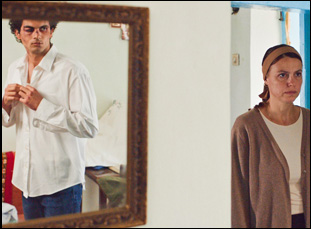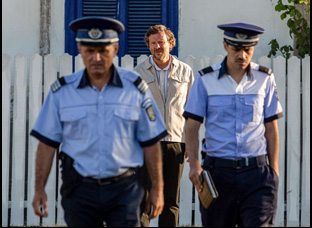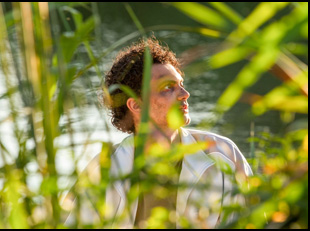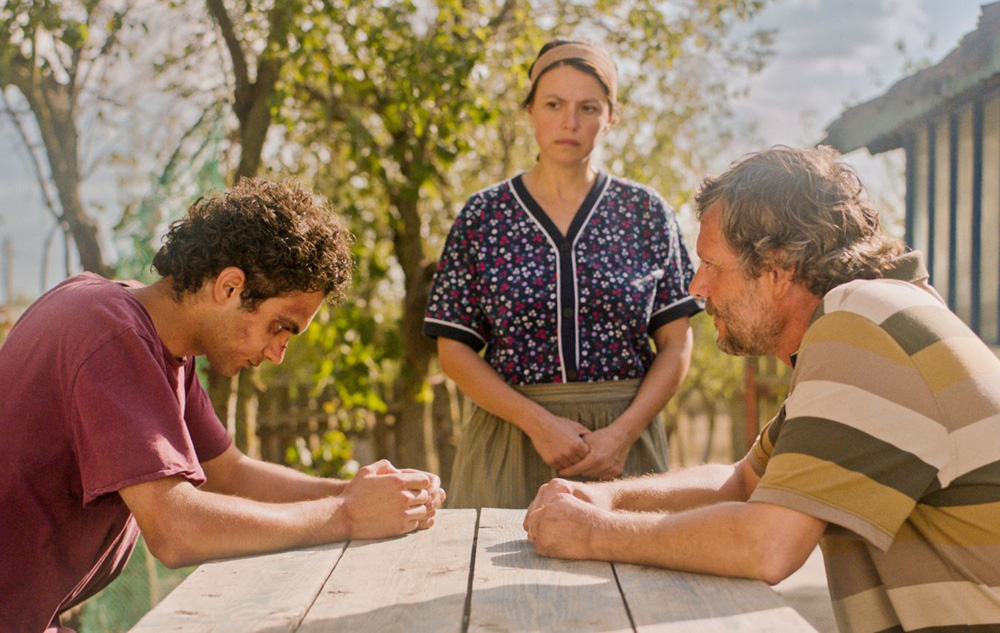Emanuel Parvu used to spend summers in the Danube Delta in Romania where he had family, a trip that always had a certain romantic air about it when you could only access the land by boat. However, that remove from the rest of the world looked less like an escape than of isolation when later in life he would learn of a rape case in the region where residents in the conservative community seemed more interested in prosecuting the survivor of the assault than the assailant, setting off a series of conversations with Miruna Berescu, with whom he co-wrote his previous efforts as a director “Meda or The Not So Bright Side of Things” and “Marocco” about the generational divide in the area, which depends on a young tourist crowd for income but remains set in their ways.
In that sense, the evocative title for “Three Kilometres to the End of the World” might’ve been the easiest part of the process when acknowledging the geographic location of where its set in relation to the North Pole, but also the feeling that the center cannot hold for much longer. However, the time it took for Parvu and Berescu to figure out the rest as far as an individual story that could express all these fissures paid off immensely in their intricate drama about a family left reeling from the brutal beating of their teenage son Adi (Ciprian Chiujdea), who was already contemplating a life far from the countryside. While his father (Bogdan Dumitrache) and mother (Laura Vasiliu) have ideas about the motive behind the attack, especially when there’s a debt owed to a local thug (Richard Bovnoczki) that the father is struggling to pay back, the filmmakers leave no doubt in the audience’s mind about what happened when Adi is seen with a male tourist is a stolen moment of physical affection, a secret regarding his sexuality kept from his family that makes his father’s search for justice far more complicated as he accompanies a local policeman (Valeriu Andriuta) around town to interrogate witnesses and potential suspects.
The community may be small, but what their attitudes reflect are far-reaching when not only the prejudice that led to the attack unfortunately transcends international borders, but the paralysis of the characters once the truth starts to emerge as they contend with cultural history, peer pressure and already fraught familial dynamics that can get in the way of engaging with one another on a purely rational level. Parvu brilliantly brings out the glorious natural environment they inhabit to reflect a resistance to change, the sound of leaves bristling at the slightest breeze and a social strata coming into focus as the police visit various houses whose place in the hierarchy seems as entrenched as their roots in the land. As an actor, he has worked with some of the best directors from Cristian Mungiu to Bogdan George Apetri and now stands shoulder to shoulder with them behind the camera, clearly sharing a meticulous attention to detail when it comes to depicting how a society functions not in some idealized version, but when real people are involved.
After first making a splash earlier this year at the Cannes Film Festival where it received the Queer Palm, “Three Kilometres to the End of the World” was selected to be Romania’s official entry to this year’s Academy Awards and recently, Parvu graciously took the time to talk about the literal groundwork involved in bringing such a story to the surface, the film’s considerate camerawork and the investment of time that goes into every scene that makes his work so ultimately moving.

The inspiration [for the story itself] was based on the community reaction from a rape case because the whole community turned against the victim. they said like she deserved to be raped, like “Look at the way she dresses.” That was the starting point of our film and [primarily] it’s a traditional, conservative society. But during summertime, because of the film festival [that happens there] and because it’s one of the most picturesque places on the whole Black Sea, everybody wants to be there, so this new, open-minded generation has to live together with the locals. It’s not reachable by car, it’s only reachable by boat and in wintertime, it’s not so accessible. Jacques Cousteau, one of the world’s greatest explorers, went there in the ’70s and he said it’s one of the most beautiful places in Europe. And then he got banned by the communist regime. He returned in ’91 after the revolution and shot a documentary there, so it’s a very beautiful place and what makes it so unique in our country because of these two worlds colliding — the North Pole and the South Pole living together for three months.
You’ve always established a relationship with the characters with the camera, but after your previous two films were handheld, this has a stillness about it. How did you decide how the camera would work?
We talked about it a year – how can we put that beautiful landscape in contrast with the narrowness of the minds that the people there have? That’s why we used so many wide shots. That place is a paradise, but still, it’s a living hell for some. It’s the third movie I’ve done with [director of photography] Silviu Stavilã, who worked with two of the great Romanian directors — Lucian Pintilie and Cristi Puiu — and we were inspired by some some camera movements and some stylistic choices that [he] did [previously] and we were also inspired by Ozu’s technique where you start a frame that’s wrongly framed at the start. If you remember the kitchen scene with the mother after [the father receives] messages [about his debt early on in the film], we start the shot with [the mother’s] head cut off [at the top of the frame]. But then you lock the camera and let the scene evolve with the mise en scene and [the actors] end up delivering the most important lines in the perfect shot.
We also did some camera movements that were inspired by Bruno Dumont or Michel Franco, similar shots with with a character that you see very far [away] and then [they] heads towards the camera and stops and then move exactly as they’re near the camera. [The character is] passing by the camera and then the camera does a 180 degree [turn] and it follows the character again into a wide shot. That’s a Hitchcock movement. So we had some inspirations.
Then the script gives you the right pace of the of what you want to say, but there were some very hard choices for the aesthetics of the film. [For instance] there were some fabrics that in artificial light [when captured on camera], but if you look at the countryside, people don’t change clothes so much during the day, so we had a very difficult choice for the fabrics because you need that fabric to shine in a different manner in an artificial light. But then if you go outside the natural light, it gives you a different shine.

It was a very difficult task for the sound and we have 16 types of winds. We all know that music can move mountains. It is so strong, but nature can help you feel much more emotion without using music, so [I thought] how can we do that without using music? The very different texture of the wind gives you the most powerful feeling and the leaves from different type of trees sound very different. We had recording before the shooting and then on the days off and after the shoot with the sound crew, especially because the Danube wind sounds very different from the sea wind, which is open. The willow trees sound very different from a different species of trees and plants. And we did recorded it sometimes with artificial wind because there were some days that nature didn’t move and we had to be far away from the blower. But we managed to record these nature sounds very well.
Knowing your own background as an actor, was there anything you’d give to the actors that you’d want from a director yourself?
We had three months of rehearsal, and I rehearse so much because I think when we end up on the set, we must focus only on the microscopic things — on the pauses and the blinking. It’s like music. You don’t say to the conductor, “I don’t feel it this way.” In order for you to be a good actor, you must comply with the notes, and maybe it’s a different vibrato that you’re doing. But you have to play that note and in order to play that note, I think your brain needs to know that nothing around you is going to harm you because our brain is focused on protecting [ourselves]. And in order for us to expose ourselves in front of a camera [where] there’s the camera, the focus puller, the sound man, the grip with the department, the lightning department, there’s everybody there watching you, your brain will protect you. You will try to show your best version of [the scene], but that best version is still acting and I need you to lose the acting. So that’s why I do at least five or six takes if somebody has to pass in front of the camera, but [if there’s dialogue], the least numbers of takes that I did was somewhere around 20 to 25 and I could go up until 40 to 45. It takes time for your brain to know that nothing around is going to harm you and you will focus only on being, not on acting. That takes time.

We needed the main actor to be part of the [LTGBTQ] community and it was very hard for us to to find him. We were thinking about postponing the shooting because we didn’t find the actor, but it’s a very funny story because [Ciprian Chiujdea] came to cast for the tourist [role], and then he got the lead. We changed his scenes after talking with him and with our friends from the community because I didn’t want to say the story from that perspective because I don’t know it when I’m not part of the community. What I know is the ugly perspective of my society, and unfortunately for me, I know it very well. So we changed his lines and we spoke with him a lot about how far can we go with the [scenes]? Is this something that really can happen in your community? And with our with the help of our friends and with Ciprian’s help, we changed quite a lot from the story [we had originally].
This is all the more powerful because of how spare it is in all respects. Was it difficult to edit?
We took out one hour and ten minutes of the film, a very beautiful side story about this character, the bodyguard of the rich guy, that shows up in the conversations. It looked great on paper, but it was so powerful that it took the emotion from the main story and were focusing on this type of homophobia and this corrupted society that, in my opinion, we have to talk about. I think an author should be inspired by the time [they] live in and should try to reflect it, and if we look in the Romanian cinema 50 to 70 years ago, this subject didn’t exist. It showed up. Why? Because it exists. And this corruption theme that happens in the society [first] showed up with the Romanian new wave somewhere around 20 years ago, which is a very powerful cinema wave. And hopefully if we talk about [homophobia] and if we point the finger towards that direction, hopefully in 20 years from now, this subject will be will be gone. We’ll have other things to talk about. But we have to talk about the ugly part of society because if if we keep going this way, it’s exactly like in the title. We have three kilometers to the end of the world, and I think we as a society are not going to the proper direction.

We’re full of joy because because what’s happening with the film, and I think if you can you can see it, you can understand it. If you’re from Germany, if you’re from Poland, if you’re from United States, from England, from Singapore, it doesn’t matter where you’re from. Being human beings, we have this double perspective because we are children of our parents and we are parents of our children, so that makes you question yourself. Am I a good human being? Am I paying attention towards my fellow men? Am I paying attention to what they they need, to what they feel? Am I a good parent?
I don’t think preaching or lecturing some someone will do any good. But I think if you if you make a mirror, it doesn’t matter if it’s literature, poetry, sculpture, theater or movies, look at yourself. I think if somebody recognizes themselves in the mirror, that’s the way to make introspection. I’m sure that right now while we’re talking, there’s two worlds going on this planet and we have very big problems like the wars going on, people dying on this planet and I know that a film cannot change the world. But I think a film can raise questions. And if if we talk about it, I think we will evolve as human beings.
And I’ve used this example before, but our brain as human beings will always attack a minority. When I was in America, I was a minority — a superficial type of minority, but still a minority. I was a Romanian director in the United States. That happened to me in France and in Germany and Spain as well, so if I get into a fight with a United States or a Spainish citizen and your brain knows that I’m a minority and we raise our voices and start insulting each other, there is a very much a possibility at the end, instead of saying to me, “You’re stupid,” as you would say to [someone from] your country, you’re going to say, “You’re Romanian,” because your brain knows that I’m a minority and it doesn’t matter the race, the skin color, the religion. Our brain attacks the minorities. We definitely need to change that. It’s a monstrous thing that we keep attacking. It’s like our animal part, an the animals are always attacking the weak. We must evolve from that.




